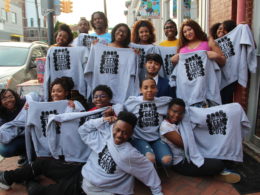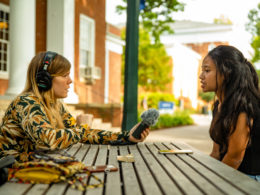When you think of April, rainy days and Easter bunnies may come to mind. But did you know it also is National Volunteer Month and Global Child Nutrition Month? To recognize these occurrences, we’re taking a look at the Northern Virginia Family Service’s (NVFS) Hunger Resource Center.
Since 1924, NVFS has offered resources and support to ensure that everyone in need maximizes their potential and fully contributes to a thriving community. While it offers a variety of services, such as workforce development, housing for the homeless and foster care/adoption assistance, one of its most important programs is the Hunger Resource Center (HRC) at its SERVE campus.
The HRC provides emergency food assistance, nutrition information and strategies for buying healthy food on a budget for nearly 600 families in Prince William County each month, helping them from having to choose between paying their bills and putting food on the table.
We caught up with Navara Cannon, the nonprofit’s community and volunteer engagement manager, to learn more about the HRC.
Can you give us a basic description of your work for NVFS?
My job is really to go out into the community and tell everyone about NVFS and the programs that we offer. That consists of saying: “This is who we are, this is what we do and this is how easy it is for you to engage with us.”
What led you to NVFS?
So I’ve been [at NVFS] 11 years in May. That’s actually a long time in the nonprofit world. I have an undergraduate and a master’s degree in communications, and the job just came along at a really good time. I was one of those people who didn’t know that opportunities for nonprofit jobs existed outside of social work or “boots on the ground,” Red Cross-type work. I had no idea that this behind-the-scenes work existed in the nonprofit sector, but it really intrigued me that I could make a living doing volunteer coordination and helping people get involved.
The engagement part of community relations is really what drew me to NVFS. I really love meaningful conversation. I couldn’t be a teacher, but I love to help people learn things. I love being able to connect with people and help them in their lives and in their journeys. I think I’m exactly where I’m supposed to be.

How has the HRC responded to COVID-19? Did the pandemic change the way it operates?
Things have changed at our HRC. Our clients used to be able to check in at the window and then come in and “shop.” We would give them things we already packed for them like a loaf of bread or a certain amount of meat, based on family size, and then they could pick the rest of their own food.
Because of COVID and the need to not have a whole lot of people in the space, the shopping part no longer happens. But we’ll still ask them if they have allergies or dietary restrictions. We try to honor any special requests, if possible, as much as we can. So they can’t come in, but the customer service is still there. We’re able to do that shopping for them because of our awesome volunteers, and they all have huge hearts.
What would you say your greatest needs are as an organization right now? Does it lean more toward fundraising or volunteers?
It’s honestly a bit of both. As far as fundraising goes, we have an amazing staff, but we are the largest food pantry in the county, and it takes a lot to run an 8,000-square-foot warehouse. We have three trucks that need gas and checkups. We have walk-in coolers and freezers that need maintenance. We need money to keep the center open and running. So, it’s always tricky when we ask for money for the pantry because it doesn’t mean we don’t need food donations as well. Yet, we still have to keep the lights on, we still have to pay staff and take care of the equipment.
Right now, I’m also in need of volunteers because of COVID. We never closed our doors since our families still needed us – regardless of the pandemic. But there are still people who are leery of volunteering, and we’ve had to cut back on how many people can be in a space. The biggest need is volunteer drivers. They take our vehicles along the routes that we’ve laid out, and they pick up food from grocery stores and restaurants and bring it back here so we can get the food out to the community. We were already tight on drivers before, but once COVID hit, the number went down even further. We just haven’t been able to build up the driving team to the point where the staff doesn’t feel like they’re under pressure to try to get all of this food picked up, so that is one of our biggest needs. That’s a longer-term commitment because there’s training involved.
If people are looking for a one-off kind of opportunity, we’re also looking for volunteers within the warehouse to help unload the food, get it sorted, get it packed and weighed out and give it to our clients.
Are there any other volunteer opportunities, besides truck driving and warehouse assistance?
Yes, if someone looks at our volunteer page or our events page, and the engagement level isn’t quite what they’re looking for, just reach out to whoever they find on that page. I think there are misconceptions about what it means to volunteer and about the type of clients we serve and why they are receiving services from us. And we work with individuals, we work with companies, churches, groups, anyone who wants to volunteer. Our work involves connecting people with meaningful engagement opportunities so that they feel that their time was well spent volunteering.
Recently, there was a group of ladies who held a haircare drive for the African American people in our shelter. Because their hair type is unique, we don’t always get those types of hygiene items donated, it’s very rare. But because [these ladies] are African American, they recognize that need and they wanted to help out, because they know that we aren’t getting the products. So it’s not them just dropping off something that we didn’t have a need for. It was a win-win.
Do people create their own volunteer opportunities often? Do you have another example of that?
A while back, there was a 5-year-old boy in our community, and for his birthday, he started a food drive. He sent out invitations and asked people to bring cans of food, in lieu of toys. He was so successful – people loved the idea. We have never had so much food donated at once. The parents that came into the center to get food for their families were so happy. They were like, “Oh, my kid’s gonna love these Spider-Man SpaghettiOs!” And I mean, the kid still got a whole bunch of toys, of course, to reward him for wanting to do something good.
There are always ways to engage that make sense for people. Just be open to forming a relationship with whatever nonprofit that you have decided that you’re interested in, and really learning about the clients and programs. Drop any bias or any pre-formed opinions that you have about the clients or the community that that particular nonprofit serves.
I’ve heard that food pantries sometimes recommend against donating Pasta Roni or similar products because the pantries can’t provide clients with the necessary perishable items, like milk or butter, to prepare them. Is that something that affects the HRC?
Because we’re so big and we have the resources, we can actually take perishables. We have a huge walk-in cooler and walk-in freezer. My favorite time of the year is when the farmers’ markets start operating again. Sometimes, the farmers will swing by and give us what they don’t sell at the market, and we’re able to keep it fresh in our coolers to give to our clients. Just like we love to get fresh produce, our clients are no different. We’re not feeding a different type of human – people love fresh ingredients. They’re always excited to get things fresh, versus frozen or canned.
I encourage people when they have decided they want to give something, to call the pantry and find out what the actual needs are. Right now, that would be things like flour, sugar, cooking oil and salt and pepper. The things that you would buy for your family on a trip to the grocery store are the same things our clients are looking for.
Are there things people shouldn’t donate to the HRC?
Unfortunately, we don’t have storage for things like mattresses or bed frames. If we get too much of something or we can’t use it, we have to pay to get rid of it – whether that’s for fuel to transport it or if our trash gets full too quickly and we have to call for an additional pick-up. So, it’s worth the few minutes to just call and check.
Items such as pillows are a better, more meaningful donation because they’re something we can use, immediately, for our clients. Same thing with diapers and wipes because we work with a lot of infants. It’s always smart to build a connection with whatever nonprofit you want to engage with and take the time to learn more about the clients that you’re really hoping to help. Our needs are going to differ from those of other nonprofits.
Around Thanksgiving and Christmas, there is definitely a greater push to donate to food pantries in the spirit of the holiday season. Is there a time of year that people don’t tend to donate as much?
Yes, we actually see fewer donations in the summer. With most of our families, the kids get breakfast and lunch at school. But when school’s out, that’s no longer an option for them. So their need for food actually increases in the summer, and we end up giving out more food overall. To help with this, we try to be really intentional in reaching out to summer camps and churches that have a vacation bible school. Because a lot of them like to get involved and do community service events with the kiddos in the summer. That’s a perfect opportunity to introduce kids to what life is like outside of their own “bubble.”
Do you have any upcoming events you’d like to share with readers?
Yes, we have our Road to Independence Gala coming up in May. It’s our biggest fundraiser of the year. I always love to see how many people really support our efforts to help families. You’ll see a lot of people there, you know, donating, networking… but we’ll also see them later in the year at volunteer events, being super engaged.
Finally, what do you like most about your job?
That we treat our clients with dignity. We didn’t hear the conversation they had to have with themselves to get the courage to ask for help. They should feel like this was the best decision they could have made. They shouldn’t feel unseen. They should feel welcomed and embraced, like somebody hears and understands them and is ready to fight and advocate on their behalf. I know, without a doubt, that every person here is going to do whatever they can to help, and they’re going to do it in a way that doesn’t demean or make this client feel less than. Because of COVID, we had a whole new demographic of people who needed us, who may have never needed help before, and they should not feel ashamed for asking for it. They need to have a sense of hope once they leave our property. That is what we do.
To learn more about NVFS, you can visit its website here. You can also follow it on Facebook and Twitter.










